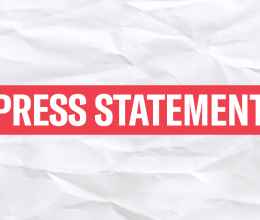To Chairman Cirino, Vice Chair Rulli, Ranking Member Ingram, and members of the Senate Education Committee, thank you for this opportunity to provide opponent testimony on Senate Bill 83.
The ACLU of Ohio has numerous, significant concerns about SB 83 and the impact it will have on academics, faculty, students, administration, and campus life. To be clear, the ACLU of Ohio does and always has supported robust free speech, academic freedom, and intellectual diversity protections on Ohio’s college and university campuses.
However, we believe SB 83 is contrary, not complimentary, to these goals. Our most serious concerns are summarized as follows. (For the benefit of the committee, language from SB 83 appears in bold and italics, with line numbers identifying the precise location):
“SEGREGATION” AND “NON-DISCRIMINATION”
Currently, SB 83 utilizes broad language and terms seemingly meant to protect Ohio’s college and university students from discrimination and segregation on campus. On the surface, that appears to be a positive development. After all, who supports discrimination and segregation? Or treating students differently?
However, SB 83’s language is so extremely broad, a partial list of what it outlaws includes (but is certainly not limited to): Single sex dormitory rooms, single sex fraternities and sororities, and single sex sports teams.
Sports are not the only extracurricular activity impacted. Using Ohio State University as an example, SB 83 presumably outlaws such current student organizations as the Association of Women Dentists, the Latino Law Students Association, and the Christian Graduate Student Alliance (and 100+ more) at just one school.
Besides prohibiting entire student organizations, SB 83 also prevents our universities and colleges from offering communications, outreach, prevention measures, and much more to targeted demographics.
So, for example, if Cleveland State University wishes to address campus sexual violence with certain measures specific to an exclusively female audience, SB 83 outlaws that. Likely also eliminated under SB 83 are classes and majors that are specific to race, sex, and more, such as Kent State University’s Department of Pan-African Studies and Ohio University’s degree in Women’s, Gender & Sexuality Studies.
“CONTROVERSIAL BELIEFS OR POLICIES”
As the committee heard during sponsor and proponent testimony, SB 83 is rooted in the idea Ohio’s colleges and universities are centers of indoctrination. SB 83 contains various language purported to prevent that. To get everyone on the same page, SB 83 offers some definitions.
The language below refers to bans in SB 83 on college and university speech, actions, and advocacy
"’Controversial belief or policy’ means any belief or policy that is the subject of political controversy, including issues such as climate change, electoral politics, foreign policy, diversity, equity, and inclusion programs, immigration policy, marriage, or abortion.” (Lines #183-187)
I will not belabor the point and will only say there is not a single topic on the planet capable of not being the subject of “political controversy.” What if a university wants to generally encourage students to vote? Some people think 18 is too young. Or that women should not be allowed at all to vote. Acknowledge or celebrate Gay Pride Month? Not under SB 83. Generally state the US should allow more foreign graduate students? Nope. All of these things and far more – if not literally everything – are “political controversies” under SB 83.
“‘Intellectual diversity" means multiple, divergent, and opposing perspectives on an extensive range of public policy issues widely discussed and debated in society at large, especially those perspectives that reflect the range of American opinion, but which are poorly represented on campus.’” (Lines #188-192)
I confess I have no idea what “especially those perspectives that reflect the range of American opinion, but which are poorly represented on campus” means. Especially since SB 83 is silent on what “American opinion” is or means, and who decides that matter, using what methods, plus what is or is not “poorly represented on campus.”
"‘Specified concept’ means a concept such as allyship, diversity, social justice, sustainability, systematic racism, gender identity, equity, or inclusion.” (Lines #193-195)
"‘Specified ideology’ means any ideology that classifies individuals within identity groups, divides identity groups into oppressed and oppressors, and prescribes advantages, disadvantages, or segregation based upon identity group membership.” (Lines #196-200)
What exactly SB 83 wants to do with all this above language and concepts is not entirely clear as at least some of it is contradictory on its face.
These principles are broadly reflected in a requirement colleges and universities “incorporate all of the following statements” into their mission statements. (Lines #159-181):
- The institution affirms that it will educate students by means of free, open, and rigorous intellectual inquiry to seek the truth;
- The institution affirms that its duty is to equip students with the intellectual skills they need to reach their own, informed conclusions on matters of social and political importance.
- The institution affirms that its duty is to ensure that no aspect of life at the institution, within or outside the classroom, requires, favors, disfavors, or prohibits speech or action to support any political, social, or religious belief.
- The institution affirms it is committed to create a community dedicated to an ethic of civil and free inquiry, which respects the autonomy of each member, supports individual capacities for growth, and tolerates the differences in opinion that naturally occur in a public higher education community.
- The institution affirms that its duty is to treat all faculty, staff, and students as individuals, to hold them to equal standards, and to provide them equality of opportunity.
I note the language directly above is one of several areas in SB 83 that will prevent colleges and universities from lobbying, advocating, and communicating with the Ohio General Assembly, and all other public and private entities, bodies, and individuals, on such issues as gun rights, voting rights, the absence but need for statewide civil rights protections for LGBTQ Ohioans, policing, and much more.
SB 83 takes a belt and suspenders approach by also requiring universities to adopt formal policies including similar language as that required in the mission statement This incorporates the definitions more explicitly (Lines #203-219):
- Prohibit any mandatory programs or training courses regarding diversity, equity, or inclusion;
- Affirm and guarantee that its primary function is to practice, or support the practice, discovery, improvement, transmission, and dissemination of knowledge by means of research, teaching, discussion, and debate;
- Affirm and guarantee that, to fulfill the function described in division (B)(2) of this section, the institution shall ensure the fullest degree of intellectual diversity;
- Affirm and guarantee that faculty and staff shall allow and encourage students to reach their own conclusions about all controversial matters and shall not seek to inculcate any social, political, or religious point of view;
- Establish and implement intellectual diversity rubrics for course approval, approval of courses to satisfy general education requirements, student course evaluations, common reading programs, annual reviews, strategic goals for each department, and student learning outcomes.
Despite the above bullet points, there is some “exceptions” language that reads:
(Bullet points 2-4 above i.e. not the anti-DEI one) do not apply to the exercise of professional judgment about how to accomplish intellectual diversity within an academic discipline, unless that exercise is misused to constrict intellectual diversity. (Lines #225-228).
This language above can be read as broadly or as narrow as one cares to argue. Proponents will surely argue it will not lead to worst case scenarios already being identified. But what we know from past experiences is when the law is unclear, and especially when motivations are clear, those impacted will self-censor, overcorrect, or altogether silence themselves for fear of punishment. Additional language required in formal mission statements (Lines #229-248)
- Affirm and guarantee that it will not endorse, oppose, comment, or take action, as an institution, on the public policy controversies of the day, or any other ideology, principle, concept, or formulation that requires commitment to any controversial belief or policy, specified concept, or specified ideology, although it may endorse the congress of the United States when it establishes a state of armed hostility against a foreign power.
This division does not include the recognition of national and state holidays, support for the Constitution and laws of the United States or the state of Ohio, or the display of the American or Ohio flag; - Affirm and guarantee that the institution will not encourage, discourage, require, or forbid students, faculty, or administrators to endorse, assent to, or publicly express a given ideology, political stance, or view of a social policy, nor will the institution require students to do any of those things to obtain an undergraduate or post-graduate degree;
- Prohibit the institution from engaging in or abetting activities such as boycotts, disinvestments, or sanctions.
The first bullet point above is additional language to ensure universities and colleges will not be permitted to lobby and advocate for a wide range of issues and matters, including expressing support for or against SB 83.
Also notice the last bullet point with prohibitions against any boycotts and related action. Such broad language goes well beyond such things as the current BDS movement regarding the Israeli government. Under SB 83, a university must continue doing business with someone else even if their decision to end the relationship is 100% business related. That is, what if the “boycott” is because the university got ripped off, or the vendor is unreliable, or any countless number of other things? None of that matters under SB 83.
More requirements for formal policies mandated via SB 83:
- Prohibit political and ideological litmus tests in all hiring, promotion, and admissions decisions, including diversity statements and any other requirement that applicants describe their commitment to a specified concept, specified ideology, or any other ideology, principle, concept, or formulation that requires commitment to any controversial belief or policy;
- Affirm and guarantee that no hiring, promotion, or admissions process or decision shall encourage, discourage, require, or forbid students, faculty, or administrators to endorse, assent to, or publicly express a given ideology, political stance, or view of a social policy;
- Affirm and guarantee that the institution will not use a diversity statement or any other assessment of an applicant's commitment to specified concepts in any hiring, promotions, or admissions process or decision;
- Affirm and guarantee that no process or decision regulating conditions of work or study, such as committee assignments, course scheduling, or workload adjustment policies, shall encourage, discourage, require, or forbid students, faculty, or administrators to endorse, assent to, or publicly express a given ideology, political stance, or view of a social policy;
- Affirm and guarantee that the institution will seek out intellectual diversity in invited speakers. (Lines #254-277)
APPLICATION TO PRIVATE SCHOOLS
SB 83 also applies part of its provisions and ideas to private colleges and universities. As a condition of ongoing and future state funding for “institutional purposes” (not including needs-based financial grants), the private schools must submit standardized documentation affirming:
- The institution is committed to intellectual diversity;
- The institution is committed to free speech protection for students, staff, and faculty;
- The institution does not require diversity, equity, and inclusion courses or training for students, staff, or faculty;
- The institution complies with the syllabus requirements prescribed under section 3345.029 of the Revised Code (created by SB 83) as if it were a state institution of higher education
- The institution complies with the prohibition of political and ideological litmus tests in hiring or promotion policies in accordance with section 3345.0217 of the Revised Code (created by SB 83) as if it were a state institution of higher education. (Lines #20-40).
All that is needed for all state funding to be revoked is for the chancellor of higher education to receive “credible information” of a violation, after which the chancellor will notify the college or university in writing. The college or university must then return state funding. SB 83 does not contain any appeals process or formal investigation requirements, only the receipt of “credible information.” SB 83 is also silent on what constitutes “credible information” and who makes that determination. (Lines #41-45)
DEI AND RELATED TRAINING
Finally, SB 83 makes illegal all required DEI (diversity, equity, and inclusion) training for any purpose whatsoever.
So, let’s say an Ohio university conducts a review or receives data demonstrating the admission or graduation rates at their school are considerably different when comparing male and female students. Or black and white students. Or students born in the United States compared to those who are not. The administration determines at least part of that problem may be due to their own actions, policies, and biases, even if unintentional.
As a result, the university implements DEI training so stakeholders and decision makers can determine what may and can be internally addressed so students are not shut out of an education at their school. Many colleges and universities utilize a separate police force with full arrest and investigatory powers.
Under a worst case scenario, undeniable evidence exists the chief or another supervisor encourages and rewards unjustified stops, questioning, searches, and arrests of black students on campus. That culture permeates the entire law enforcement entity. With SB 83, it is illegal for the university to require DEI training for current and future employees with the goal of minimizing such things from occurring in the future.
During proponent testimony, we all witnessed a small parade of exclusively older, white, male witnesses decrying anything that sounds, looks like, or appears to be reactive or proactive steps and measures to ensure students are not left behind because of their race, sex, nationality, disability status, and more. One went so far as to proclaim “white privilege” is essentially a farce because of the existence of poor white people in Appalachia with legitimate and unfortunate struggles. No DEI or related training or literature I have ever seen maintains white people face no problems because of their skin color. Rather, the training I have witnessed and participated in explains those problems are reality – but made even worse when one’s skin color is dark instead of light
In Ohio, we are unfortunately and rapidly sinking into an environment where DEI training is framed and dismissed as unnecessary at least, and harmful or destructive at worst.
The world is not a level playing field. Neither are our universities and colleges. Students, because of their religion, their sex, their skin color, their nationality, their physical abilities, and more are sometimes unable to reach their full potential, or even get their foot in the door, to improve their lives. There are times the barriers in their way are unintentional. They may be one-on-one or systemic in nature. Whether they are intentional or not, whether they are systemic or not, the barriers are genuine.
Ohio’s universities and colleges should be applauded and encouraged when they take meaningful steps to address these barriers. Instead, SB 83 goes the opposite direction. That SB 83 only addresses mandatory DEI and similar training, but does not altogether prohibit it, is of no solace. The worst offenders could also be the ones who will then refuse to participate in any kind of DEI training at all. That only increases these problems when we should trying to minimize and solve them.
For all these stated reasons and others not addressed here today for the sake of brevity, the ACLU of Ohio encourages this committee to reject Senate Bill 83.








